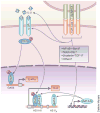Cytokines of the γ(c) family control CD4+ T cell differentiation and function
- PMID: 23080204
- PMCID: PMC4825860
- DOI: 10.1038/ni.2431
Cytokines of the γ(c) family control CD4+ T cell differentiation and function
Abstract
Naive CD4(+) T cells undergo massive proliferation and differentiation into at least four distinct helper T cell subsets after recognition of foreign antigen-derived peptides presented by dendritic cells. Each helper T cell subset expresses a distinct set of genes that encode unique transcription factor(s), as well as hallmark cytokines. The cytokine environment created by activated CD4(+) T cells, dendritic cells and/or other cell types during the course of differentiation is a major determinant for the helper T cell fate. This Review focuses on the role of cytokines of the common γ-chain (γ(c)) family in the determination of the effector helper T cell phenotype that naive CD4(+) T cells adopt after being activated and in the function of these helper T cells.
Figures




References
-
- Dubois S, Mariner J, Waldmann TA, Tagaya Y. IL-15Rα recycles and presents IL-15 in trans to neighboring cells. Immunity. 2002;17:537–547. - PubMed
-
- Rautajoki KJ, Kylaniemi MK, Raghav SK, Rao K, Lahesmaa R. An insight into molecular mechanisms of human T helper cell differentiation. Ann Med. 2008;40:322–335. - PubMed
Publication types
MeSH terms
Substances
Grants and funding
LinkOut - more resources
Full Text Sources
Research Materials

